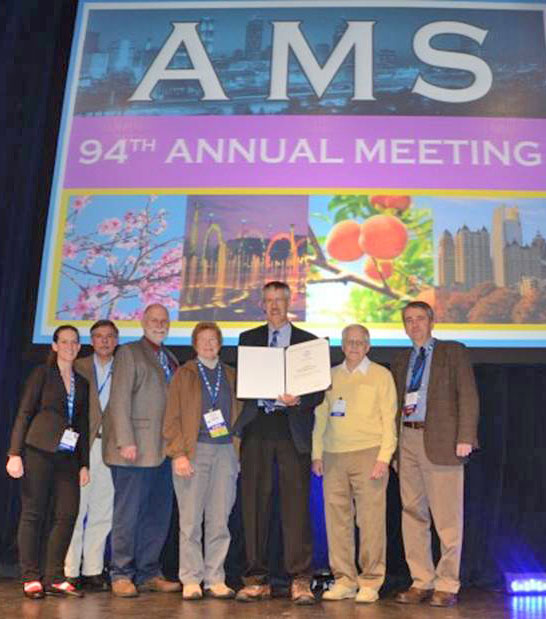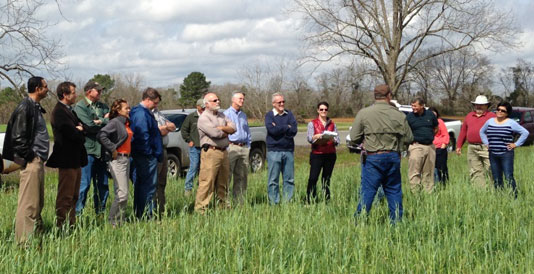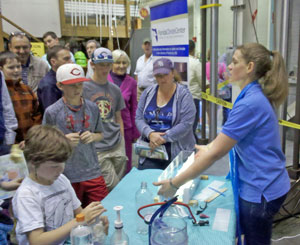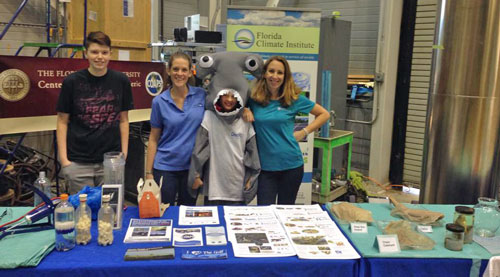Dear Florida Climate Center Friends,
We'd like to present you with the March 2014 edition of our newsletter. In this newsletter, you'll find our monthly climate summary, a list of special events that our staff attended, some pictures, and more. If you have any questions, please email us at climate@coaps.fsu.edu.
Thanks,
The Staff of the Florida Climate Center
 |  |  | David Zierden
State Climatologist | James O'Brien
Professor Emeritus | Melissa Griffin
Asst. State Climatologist |
|
|
Daylight Saving Time
Just a friendly reminder to everyone that Daylight Saving Time begins at 2:00 AM on Sunday, March 9th. Make sure that, before you go to bed the night of the 8th, you turn your clock ahead by one hour to reflect the change.
|
February Climate Summary for Florida
|
 American Meteorological Society Presentation Assistant State Climatologist Melissa Griffin attended the 94th Annual Meeting of the American Meteorological Society (AMS) in Atlanta, GA. She presented as part of the 26th Conference on Climate Variability and Change, which was held in conjunction with the AMS Annual Meeting. Her presentation, entitled "Using Analog Methods to Illustrate Possible Climate Change for Agricultural Producers," showcased ongoing work done with Pam Knox at the University of Georgia. The purpose of the research is to show what has happened with climate in historical records so producers can use this information in their future climate mitigation and adaptations strategies. Ms. Griffin, a state coordinator for the Community Collaborative Rain, Hail and Snow Network (CoCoRaHS), was on hand to see the organization receive a special award from AMS for "building a community of over 1500 volunteers dedicated to providing high quality reliable observations of daily precipitation across the United States." |
|
State Climatologist Helps Cotton Farmers Anticipate the Weather
In what has become an annual tradition, State Climatologist David Zierden was an invited speaker at the Wiregrass Cotton Expo on February 14th, 2014. The program is sponsored by Auburn University and Extension and included experts on cotton and other commodity markets, pests and disease, and cotton varieties and seeds. David Zierden presented on the climate of the past season and the exceptionally rainy summer. The southeast Alabama region was one of the wettest in the country, with the weather station at Geneva, Alabama, registering over 92 inches of rainfall over the past year. That was followed with an assessment of the Pacific Ocean and a discussion of the likelihood of El Nino developing during the summer months. The presentation concluded with an outlook of anticipated rainfall and temperature patterns for the spring and early summer and how the planting season could be impacted.
|
|
Local Area Classroom Outreach
After having to reschedule due to last month's freezing rain event, Assistant State Climatologist Melissa Griffin spent a day at a local middle school as part of their Visiting Scientist Series, presenting weather and climate basics to 6th grade students. Ms. Griffin talked about cloud formations, global circulation patterns, and, at the students' request, why they got a snow day with no snow. The following day, Ms. Griffin took part in judging 5th grade science fair projects at a Tallahassee area elementary school.
|
|
Row Crop Working Group Meets in Headland, Alabama
State Climatologist David Zierden is the climate science lead for the Tri-State Climate Working Group for Row Crop Farmers, a learning community formed with funding from NOAA and USDA. The broad aim of this Tri-state climate group is to encourage ongoing interactions among row crop stakeholders for knowledge exchange and learning. Participants explore management options for adapting production systems in the face of a changing and variable climate. Workshops build and strengthen relationships and communication among participants involved in research, outreach, and practice. We emphasize hands-on, peer-to-peer learning through on-farm field visits, experimentation, and in-depth discussions. We strive to facilitate a two-way flow of information and ideas within this network so that local experiences can influence research directions (and vice versa). The group met for the 9th time in three years in Headland, Alabama, on February 20th. Climate topics for this meeting include a review of the 2013/2014 winter weather and possible causes, and an outlook of predicted rainfall and temperature patterns in the spring and summer. Field trips included a visit to a local Satsuma orchard and to various farms employing the use of winter cover crops.

|
|
 Mag Lab Open House Mag Lab Open House
Assistant State Climatologist Melissa Griffin took part in activities at Florida State University's High Magnetic Field Lab (MagLab) Open House on February 22nd. Nearly 5,000 people attended the even, and were able to tour the MagLab and take part in different experiments throughout the day. Ms. Griffin, along with Meredith Field, Amelia Vaughn, Alexandra Keclik and Lauren Zuromski from the Center for Ocean-Atmospheric Prediction Studies (COAPS), presented a variety of hands-on atmospheric and oceanographic demonstrations. Ms. Griffin also talked about the CoCoRaHS Program, discussed severe weather, led some simulations of fronts and air masses using a density flow model, created indoor clouds and even quizzed attendees about Florida's climate.

|
|
Meeting with BRACE Colleagues
At the end of the month, both David Zierden and Melissa Griffin, along with Vasu Misra, Lydia Stefanova and Tim LaRow of COAPS, met with colleagues from the Florida Department of Health involved on the BRACE (Building Resilience Against Climate Effects) project, funded by the Center for Disease Control. As part of the meeting, the group discussed the work that has gone into climate and health profiles for the state, a review of the products and research that is still being conducted and the climate data needs for the second and third years of the project.
For more information on the Florida BRACE project, visit: http://www.floridahealth.gov/healthy-environments/climate-and-health/brace.html
|
|
Upcoming Events
March 15, 2014:
Science Saturday in the Park at Railroad Square Art Park in Tallahassee, FL
April 1-3, 2014:
Southeast Regional Climate Center Technical Advisory Committee Meeting in Raleigh, NC
April 15, 2014:
Florida Department of Health BRACE Technical Advisory Committee Meeting in Orlando, FL
May 6, 2014:
USDA/NIFA Program Planning Meeting in Tallahassee, FL
May 7-9, 2014:
Southeast Climate Consortium Spring Meeting in Tallahassee, FL
May 19-22, 2013:
Managing and Utilizing Precipitation Observations from Volunteer Networks in Estes Park, CO
|
|
Sample Data Request
Not all requests that come to the center are made on the phone or through email, sometimes a request comes from talking to someone at one of the outreach events the staff attends. And sometimes requests for information don't always fall within Florida state lines. This month, an interesting request came from a citrus grower in southern Georgia while he was attending the MagLab Open House. The grower was interested in the cold weather he experienced in January, and the return frequency of minimum temperatures below 20˚F. By working with UGA Agricultural Climatologist, Pan Knox, Melissa Griffin was able to provide the producer with the data he requested, links to AgroClimate (www.agroclimate.org) freeze resources and decision support tools and information on the cli-MATE database (http://mrcc.isws.illinois.edu/CLIMATE/) available from the Midwestern Regional Climate Center.
|
|
About Us
The Florida Climate Center is part of a three-tiered system of national, regional, and state climate offices, including NOAA's National Climatic Data Center and the Southeast Regional Climate Center. The Florida State Climatologist and other staff at the Florida Climate Center provide the following information and services to the people of Florida:
· Climate Data:
Historical weather observations for weather stations throughout the state of Florida. We are able to provide data for most stations from 1948-present.
· Climate Information:
Long-term historical averages for various stations, climate divisions, and the entire state.
· Extreme Event Records:
Information and analyses on extreme events such as freezes, droughts, floods and hurricanes.
· Special Analysis:
With their vast knowledge of El Niņo, La Niņa and climate variability, the State Climatologist and staff can offer expert insight into Florida's climate trends.
· Outreach:
Activities, presentations, and workshops that inform and educate the people of Florida about current and emerging climate issues. We also coordinate volunteers for the Community Collaborative Rain, Hail & Snow Network (CoCoRaHS).
More About Us
|
|